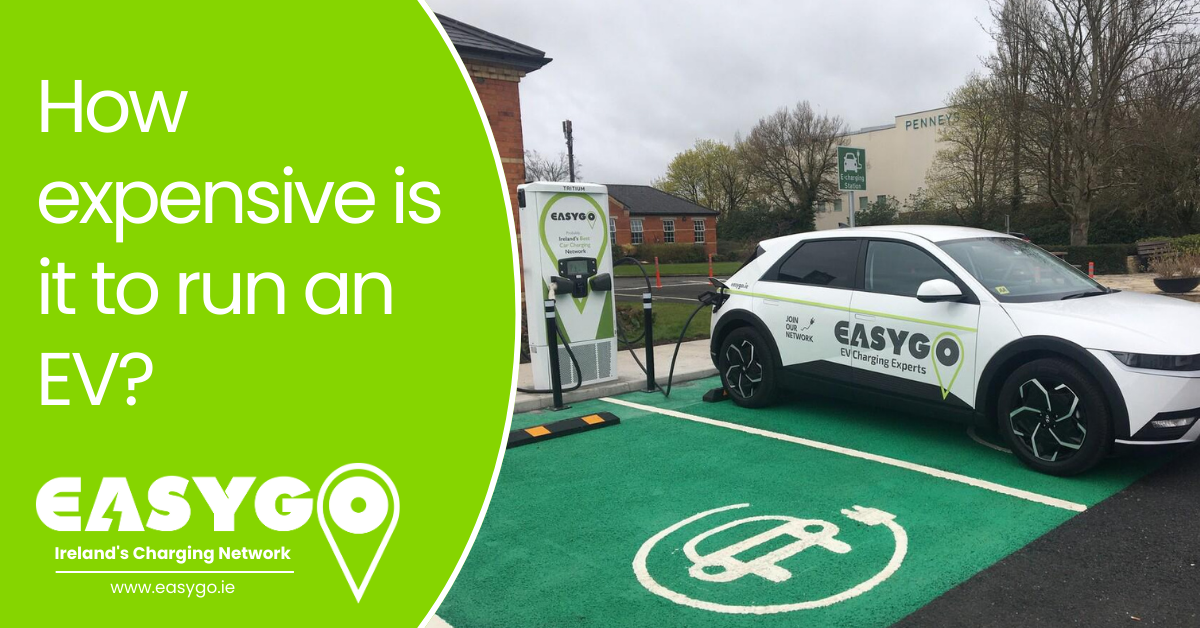
28 Nov How expensive is it to run an Electric Car?
Introduction
As Ireland moves towards a sustainable future and more people are taking the step towards reducing carbon emissions, the popularity of electric vehicles (EVs) is increasing substantially. In October 2023, the latest vehicle licensing figures from the Central Statistics Office (CSO) show that 25% of new cars licensed in Ireland were EVs. This increases to 45% when plug-in hybrid EVs (PHEV) and hybrid cars are included.
In the current climate-conscious era, the attraction of EVs goes beyond their design, technology and reduced emissions. For many prospective EV owners, their biggest question is “What does it actually cost to run an EV”? From the initial purchase price to charging infrastructure and government incentives, understanding the subtleties of owning an EV in Ireland allows you to make an informed and sustainable decision. Read below to discover the average costs you can expect with your EV and some surprising cost savings.
Charging Costs
Charging an EV can be dependent on several factors, so it can be difficult to pinpoint the exact cost of charging.
Vehicle Battery Size and Design
An EV’s battery can greatly affect how long it takes to charge, and in turn the price of charging. A larger battery with higher kilowatts will require more energy and take longer to fully charge but will give you further range.
Smaller batteries need charging more frequently as they don’t yield the same capacity but charge quicker. They are better suited for shorter driving distances than EVs with larger batteries.
Lighter vehicles with smaller batteries tend to use fewer kWhs due to their design and weight. Design factors such as the size of wheels, quality of tires, and the shape of the vehicle can also determine how much power is used and therefore how often a vehicle needs to be charged and how much it costs to charge.
Types of Chargers
For public charging, there are two types of chargers – AC and DC. The main differences between these two chargers are the speed and cost. AC chargers generally allow charging up to 22 kW, whereas DC chargers allow rapid charging up to 50kW and ultra-rapid charging up to 350kW, and these are more expensive to operate.
EasyGo is the fastest-growing EV charging network on the island of Ireland with over 4,000 public charge points, both AC and DC, available to our drivers with one app.
Home charging is cheaper, and often more convenient, than public charging. If you have a charger at home, you can utilise slower or night rates for more cost-effective charging. Eco-Smart chargers like Zappi can also help to lower costs. EasyGo’s team of experts specialise in the installation of EV chargers and accessories for your home. We also provide advice on power management and installation practices on what will suit your car the best.
Average Costs
The average EV consumes approximately 15kWh for every 100km travelled, and the average Irish driver travels less than 20,000km per year. According to recent figures, on average it costs €0.21 per kWh to charge your car at home overnight if you have a day/night meter. Based on the average energy consumption of a VW ID4 (52 kWh battery), a 100km drive would cost approximately €3.42, and it would cost €684 per 20,000km.
Some workplaces also offer free or low-cost EV charging for their employees. At EasyGo, we offer tailored charging solutions for businesses, retailers, utility services, Councils and government organisations to deliver the EV infrastructure their drivers need. Our future-proofed solutions are scalable, enabling us to be long-term and reliable partners for the future.
EasyGo’s fully integrated solutions support charging at home, in work and on-the-go with full interoperability onto the ESB and IONITY/Circle K networks. Through our fleet management solutions, we provide the right charging solution at the right capacity for both the EV driver and their own location with end-to-end revenue and billing management.
Taxes
In the Republic of Ireland, EVs fall under the lowest tax band for motor tax which is €120 per year. In the UK, taxing an EV is free up until 2025. From the 1st of April 2025, EVs will be taxed at the lowest first-year rate of VED which is £10 per year. After that, EVs will be moved to the standard rate of £180 per year.
In the Republic of Ireland, to incentivise the purchase of EVs, you also qualify for a toll reduction of 50% for battery EVs (BEVs) and 25% for plug-in hybrid EVs (PHEVs). BEVs also qualify for a 0% Benefit-in-Kind rate up to €50,000.
Maintenance
EVs have 90% fewer moving parts than ICE cars – there is no engine, oil, clutch, gearbox, or exhaust, only the electric motor. The reduced number of parts that can degrade will save you money on servicing your vehicle. There is also less wear and tear on the brake pads due to an EV’s use of regenerative braking.
With these points in mind, embracing EVs isn’t just a commitment to a greener future but a positive financial decision as well. Although the initial investment may seem substantial, the long-term savings on fuel, maintenance, and potential government incentives balance this out. According to myenergi, you can expect to save an average of €57 per month or €804 annually on fuel savings alone.
If you’d like more information on how to sign up and access the EasyGo network, click here or contact us at sales@easygo.ie.


